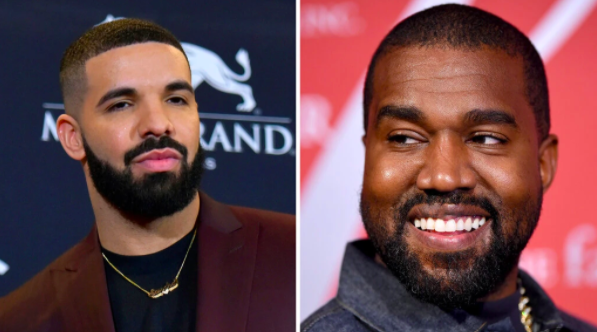Drake, Kanye, and Aligning With Abusers

Whether or not you’re a fan of rap, you’ve likely heard the names “Kanye West” and “Drake”; these rappers are two of the most consequential and popular figures in the genre. Each rapper delivered new albums to their audiences at the end of this summer; Kanye released a 27-track project titled Donda on August 29, while Drake opted for a 21-track album dubbed Certified Lover Boy, released on September 3. The most enduring and incendiary commentary both men make on these albums doesn’t come in the form of lyrics, however, but in the collaboration choices they made on some tracks: Both artists opted to align with abusive men on both albums, making fandom of either artist harder to justify.
Just two days before his album’s release date, West took over Soldier Field in the heart of his hometown of Chicago for a massive listening party with thousands in attendance. West recreated his childhood home in the center of the stadium, where he stood alongside artists Marilyn Manson and DaBaby. DaBaby has displayed many instances of morally frustrating behavior, including his recent disparaging remarks about gay people and continued willingness to openly work with and laud alleged abusers like rapper Tory Lanez. Manson is the subject of several decades worth of sexual abuse allegations from multiple women.
Kanye’s album is named after his mother, Donda West, who was also Kanye’s muse. She unfortunately passed away in 2007 after complications resulting from plastic surgery. Far be it from me to pass judgement as to how Kanye West wishes to commemorate his mother or her name, but it is at least a little distasteful to feature men who have abused women on the album named for her.
Drake’s transgression, while subtler than West’s, was no less distasteful: R. Kelly has a writing credit on the eighth song on Drake’s latest album, titled “TSU.” It’s hardly possible to justify attaching an alleged sexual abuser who has been the subject of decades of allegations and legal charges to one’s album. It seems even less justifiable given Drake’s affinity for the late recording artist Aaliyah; Drake has referenced Aaliyah in countless songs, openly penned the late artist letters, was briefly slated to produce a posthumous Aaliyah album, and credits her as being a massive inspiration and influence on his musical stylings. Hell, he even has a tattoo of her on his back. And yet Aaliya infamously married R. Kelly when he was 27 years old and she was just 15.
Fans didn’t shy away from calling out both artists. Some listeners simply couldn’t get over the fact that the inclusion of R. Kelly and Marilyn Manson on major projects suggests accusations of sexual assault simply don’t impact the careers of abusive men. Others simply voiced outright disgust over Drake’s decision to credit R. Kelly. Rolling Stone even went as far as to posit the question of whether or not R. Kelly and Marilyn Manson should be banned from music at large.
Following this backlash, Drake’s producer, Noah “40” Shebib, tried to explain R. Kelly’s writing credit via Instagram, arguing that an R. Kelly song is playing in the background of the song, which required Drake to license it, but no significant lyrics of R. Kelly’s are present. While music licensing may be a tricky business, it still seems that Drake and his army of producers could have chosen a different sample given that Shebib himself defends its current inclusion by claiming it’s relatively insignificant. Instead, R. Kelly’s name, no matter how much of a footnote it may be, remains inextricably linked to Drake’s track list. The issue here is the principle, or lack thereof, in Drake crediting the noted abuser of a woman whom he claims to adore, instead of using the countless creative resources and judgment at his disposal to opt for something else.
While both men can collaborate with whomever they’d like, there’s no getting around the fact that each artist has clearly prioritized their own artistic preferences at the cost of sending a painful message to their fans. In Kanye’s case, his alignment with abusers seems to be a product of his own ego and grotesque showmanship, while in Drake’s case, it was likely out of misjudgment or laziness. But no matter the reasons behind these choices, it’s impossible not to notice the ways in which women and their memories are so frequently insulted and bulldozed at the behest of male fame. It’s unfortunate, and perhaps all too common, that diligence for appreciating fans and personal integrity are undercut for the sake of “art.”
More articles by Category: Arts and culture
More articles by Tag: Music, Sexism


























